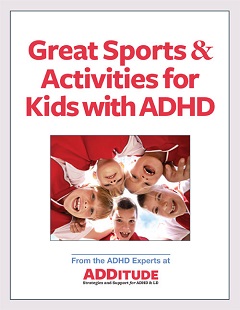If you were to run into Jackson, my former patient, you would meet a compact 21-year-old in jeans and an untucked shirt, who speaks articulately about his plans for the future — a typical American college kid, if not a little smarter. What stands out about him isn’t so much where he is today, but how far he has come to get here and how he did it with an alternative ADHD treatment.
Jackson, who has attention deficit hyperactivity disorder (ADD ADHD), runs nearly every day — three miles on days that he also lifts weights, six miles on the others. “If I don’t do it, it’s not like I feel guilty,” he says. “I feel like I’ve missed something in my day, and I want to go do it. Because I figured out that, while I’m exercising, I don’t have trouble concentrating on anything.”
Jackson was diagnosed with ADHD early on, after his third-grade teacher picked up on his disruptive behavior and inability to complete class work. He began taking Ritalin and stayed on some form of stimulant throughout his school years.
As a day student at a top-ranked private academy, he simply had more work than he could get through. At one point, I had him taking Adderall, Paxil, and clonazepam, a long-acting anxiety drug.
Jackson squeaked through with a 1.8 GPA, far too low to go to the college he hoped to attend, despite family connections. A small junior college accepted him, though, and that was just fine. The triumph of completing school, along with the comfort of having a destination the next fall, put him on top of the world. In fact, he felt so good that summer that he decided to go off his medication—all of it. (Needless to say, I wasn’t in the loop at the time.) “I noticed that a lot of small things that bothered me went away,” he reports.
The real turning point of the summer happened in Spain, on a trip with his girlfriend. Walking around shirtless on the beach, with all the “Spanish dudes,” he was inspired to do something about his Buddha belly. “I just started to run,” he says. “And I started feeling great.”
Jackson’s story appeals to me, partly because he got into exercise for his body image but stuck with it for the therapeutic effect. At first, the running didn’t make a dent in his physique (thanks to pizza and beer), but he stuck with it because it helped him focus. In his first semester at the junior college, he earned a 3.9 GPA, and, after a year, he was accepted as a transfer student at the college he had originally wanted to attend.
Jackson is clearly tuned in to his own state of mind. If he falls off his exercise regimen, his concentration wavers. He knows how it makes him feel, and that knowledge itself keeps him going. “When I started exercising, I suddenly was able to concentrate on things that were important to me,” he says. “There’s never been any question in my mind that exercise is related to concentration. Once I made this huge life change, and committed to exercise, it was very clear to me that things started to change in my life.”
Game On! The Best Sports for Impulsive Children
Not everyone with ADHD will experience the sweeping effect of exercise that Jackson did. And I would have never suggested he abruptly quit taking his medication, especially the antidepressant. His experience begs the question of whether exercise can replace Ritalin or Adderall or Wellbutrin, and, for the vast majority of cases, I would say the answer is no. At least not in the way James Blumenthal, Ph.D., and his colleagues at Duke University showed that exercise can stand in for Zoloft in treating those with depression.
Yet there is something instructive in Jackson’s motivation for discontinuing his medication. I think he felt out of control, knowing that he was smart enough to succeed but unable to make it happen. Constant frustration can lead to feelings of demoralization, and, in Jackson’s case, this fed his depression and anxiety. For him, taking medication created a sense of dependency, exacerbating those feelings. Conversely, getting into a running routine provided a sense of control over his inner self—his mood, his anxiety, his focus. For the first time in his life, he felt like he could steer his own future. He used running as his medicine.
Engage the Brain
According to the broad science, exercise tempers ADHD by increasing the neurotransmitters dopamine and norepinephrine—both of which play leading roles in regulating the attention system. With regular physical activity, we can raise the baseline levels of dopamine and norepinephrine by spurring the growth of new receptors in certain brain areas.
Exercise also helps balance norepinephrine in the brain stem’s arousal center. “Chronic exercise improves the tone of the locus coeruleus,” says Amelia Russo-Neustadt, M.D., Ph.D., a neuroscientist and psychiatrist at California State University. “The result is that we are less prone to startle or to react out of proportion to any given situation. We also feel less irritable.”
Similarly, I think of exercise as administering the transmission fluid for the basal ganglia, which is responsible for the smooth shifting of the attention system. This area is the key binding site for stimulants, and brain scans show it to be abnormal in children with ADHD.




